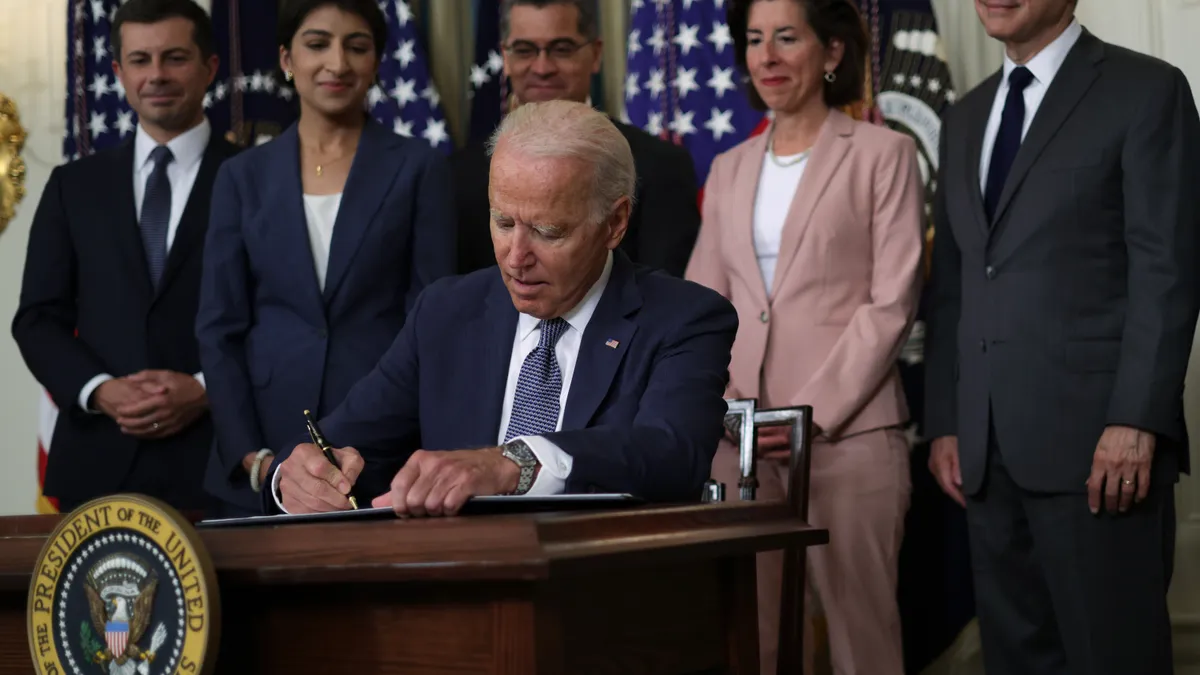The amount of data your company stands to amass from an acquisition could be the reason your deal is blocked on antitrust grounds, a compliance specialist says.
As part of the whole-of-government approach President Joe Biden announced last year when he released an executive order to curb consolidation on antitrust grounds, the Federal Trade Commission and other agencies are being directed to look into companies’ data practices as part of the Hart-Scott-Rodino (HSR) compliance process.
In a staff memo she released shortly after Biden issued his order, FTC Chair Lina Khan talked about “broadening our frame” on antitrust enforcement to include data consolidation as one of the elements regulators should scrutinize.
“We need to take a holistic approach to identifying harms,” she said.
Enforcement question
What this will look like in practice is unclear; no deal has reportedly been held up yet on data consolidation grounds, but it’s something general counsel might benefit from having on their radar screen if their company is proposing an acquisition that could result in a significant concentration of data.
“How [the data consolidation objective] gets enforced, and whether it will be enforced, is a question,” Level Legal CEO Joey Seeber told Legal Dive.
Seeber’s consultancy helps companies comply with second requests under the HSR Act. The 1976 law requires document-intensive submissions to a regulatory agency if it sees something in the initial submission that raises antitrust concerns.
Second-look snags
The lion’s share of deals subject to a second request are eventually cleared to proceed, but with the administration saying it wants to take this broader approach, it’s possible some mergers could get snagged if data consolidation is construed to be a threat to competition in a sector.
“Traditionally, they’re looking at … industry market concentration,” but now they’re saying they want to look at “how you collect the data and what data you’re collecting and for what purpose,” Seeber said. “Is there then an anti-competitive effect of this party’s data and this party’s data being combined?”
Based on information he included in his order, Biden appears to have the biggest tech companies in his sights.
“Many of the large platforms’ business models have depended on the accumulation of extraordinary amounts of sensitive personal information and related data,” Biden said in his statement.
The extent to which the administration is prepared to go after these companies is a question, because to do so would draw resources away from less high-profile deals.
“There’s the question of interpretation, but then there’s the question of the resources and the fortitude to pursue some of these,” Seeber said. “If you’re going after the big ones, you’re going after the big guys. Does the Securities and Exchange Commission (SEC) or whichever agency really want to take that on with all of the resources that will mean?”
Data privacy focus
Separate from the administration’s antitrust concerns, data concentration is high on Congress’ agenda. The House Energy and Commerce Committee a month ago passed comprehensive federal data privacy legislation, the first time a big-bill approach has made it out of committee.
The legislation is built around the idea of data minimization as a way to limit how much data companies can amass. Although companies would still be able to collect data on people who engage with them, they can only collect and keep the bare minimum of what’s needed to do certain things, like verify an identity or complete a transaction. The extent to which they can share or sell that data to others is limited.
The bill is expected to pass the House and analysts say it has a decent, although still unlikely, chance at passing the Senate.
If the bill doesn’t eventually end up in the hands of the president for signing, that gives the administration more reason to double down on its data concerns.
“I think the administration assessed that the likelihood of there being sweeping federal legislation becoming law was low and wanted to act quickly,” Seeber said. “I think that was the motivation from the beginning” in making data a part of its antitrust agenda.











